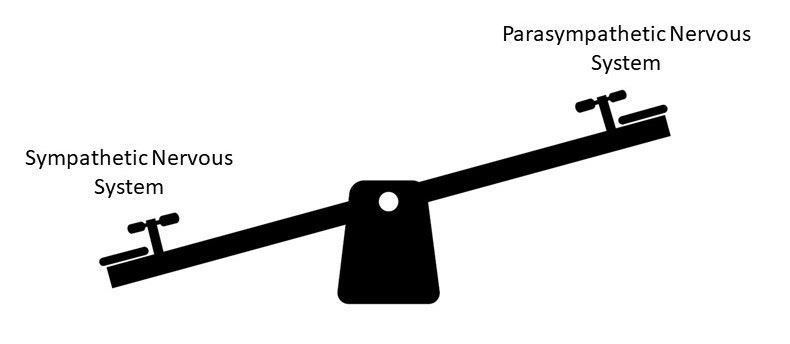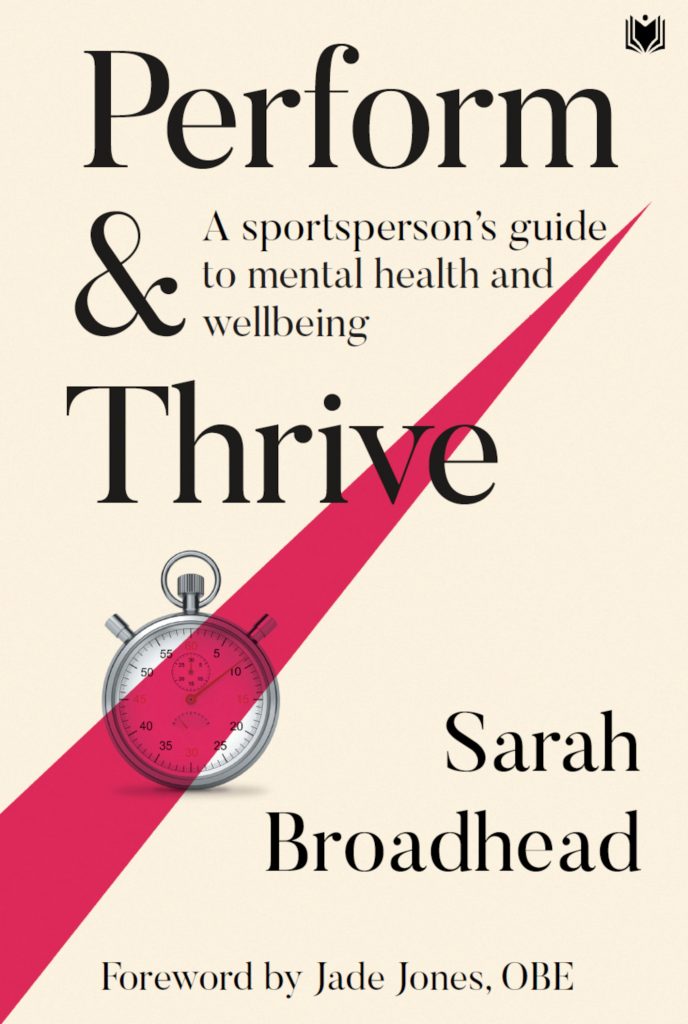From Chapter 5 of…
Managing stress, fear, and anxiety
Stress, fear, and anxiety are terms that are often used interchangeably, and which can have similar impacts on your body, but there are differences that are worth understanding. Figuring out which ones you are experiencing will help you deal with them more effectively. These are vital skills if you want to thrive in sport and life.
Stress
This is when there is a demand that causes you to get ready for action. Energy is directed to parts of the body such as the heart, lungs, and muscles, with less going to other areas like the digestive system. Your awareness also narrows and alertness levels increase.
Stressors can be physical or psychological. They might include: a cold room where your body shivers to keep warm, lifting heavy weights, a difficult conversation (or imagining having one), or lots of activities to fit into a day. Once the stressor has gone, your body should return to a calm state. Stress – in the right amount with the right recovery – is good for us. You can have stress with or without fear and anxiety.
Fear
This is an emotion that shares many of the physiological responses with stress and anxiety, such as increased heart rate and breathing. There is a perception of immediate threat in the moment or a memory of a past threat. Your brain wants to keep you safe and avoid negative consequences, so you get a fight, flight, or freeze response.
To keep safe, I will attack, run away, or do nothing/tune out from what is going on (disassociation). An example of fear might see you on a start line and seeing the task ahead of you as threatening, as you don’t feel prepared. You might have had an injury and the fear of it happening again means you are scared to push yourself.
Anxiety
Anxiety is thinking about the future and imagining or predicting threat. This consists of thoughts and physiological responses such as sweaty palms, high heart rate, quickened breathing, or tension in your muscles and jaw. You might imagine something going wrong when you next compete and have thoughts such as ‘What if I am not fit enough? What if I mess up(?)… I could get injured.’
Stress, fear, and anxiety are understandable experiences, given how our minds work as they try to keep us safe. Stress, fear, and anxiety can lead to trouble sleeping, concentrating, enjoying life, and performing how you want to. They can impact on your mood and how you interact with others; you might become more irritable, angrier, or quieter than usual. If you have high levels of demands in your life – that are not well-managed – they can increase the likelihood of injury due to inattention, distraction, increased muscle tension, and impaired coordination. So, managing stress is important (for the sake of you, your relationships, and your performance)! As a way of coping, we might use strategies such as avoidance or numbing that help in the short term but not in the long term.
What influences whether you experience stress, fear, or anxiety?
You might have noticed that your ability to deal with challenges in life can vary over time. Below are some examples of factors that play a part:
- Your personality
- Past life experiences
- How others around you respond to challenges
- The number of challenges you are currently facing
- How tired you are
- Your comfort or familiarity with the situation
- Your menstrual cycle, in females
- Your support networks
Whilst you can only influence some of these factors, it can be useful to acknowledge them to help you understand why you feel the way you do. We saw in Chapter 4 how important it is to develop good relationships and what to do if you experience fear and anxiety due to relationship issues. Having good relationships and support to tackle fears and worries is helpful.
Stress (cont.)
Let’s delve a bit deeper into stress. People often say, ‘I feel so stressed; my stress levels are sky-high,’ and stress can get a bad press when, in fact, it shouldn’t.
The complete absence of stress is not good for us.
Imagine sitting on a beach all day, every day, with nothing to do. The idea might sound great, but the novelty soon wears off and you would need some stimulation and challenge. Getting the amount of stress right for you, and having time to recover, is crucial. It works like a see-saw. The stressor activates the body, so it is ready for action, tipping the see-saw to one side and releasing adrenaline and cortisol (the sympathetic nervous system is activated). After the stress has gone, the see-saw tips back the other way to the calming system (the parasympathetic nervous system).

Short-term stress has positive impacts and can help immune function, alertness, and focus. If you spend too long on the ‘ready for action’ side with high levels of adrenaline in your body, though, it can have negative impacts such as weakening your immune system and affecting your sleep. All the demands in your life combine and contribute to the level of stress on your body and brain, so – as well as training – you could have work, study, exams, life admin, and difficult relationships to contend with.
Ideas for managing stress
We will look at three strategies:
- Remove or reduce the source of stress
- Reinterpret the source of stress
- Recover from demands
Remove or reduce
Sometimes, it is possible to remove or reduce sources of stress; for example, if you have got a week of exams or lots of meetings, you might reduce the number of training sessions you do or say no to an event you have been invited to. If a relationship is difficult, you might consider ways to improve it. This is called problem-focused coping. You could:
- Plan and pre-empt harder weeks of training and check other commitments to avoid overload. Have a planner that shows all activities
- Prioritise what is most important each week, based on the bigger picture (this will help you make good decisions). You can create a rating system that helps you determine what the important things are, which stops things that seem urgent (but are not) taking over your day
- Make life easier by setting reminders and finding the most efficient way to do things. Having a packing list for trips will help save time and energy, for example
- Ask for help if you need it
Not everyone finds planning easy. If a lack of planning and organising is making it hard to manage the demands placed on you, then find a planning process that works for you. This might be sitting down on Sunday night and mapping out the week ahead. Planning frees up mental energy to do more of the things you enjoy.
In the moment stress – If you feel like there are demands on you, and you want to feel calmer in that moment, then this breathing exercise is the quickest way to achieve that. Telling yourself (or someone else telling you) to just calm down usually doesn’t work!
This breathing exercise is called the physiological sigh[1] and involves taking two inhales through your nose, followed by a long, vigorous exhale. The exhale needs to be longer than the inhales. Repeat this several times. The breathing process activates the calming parasympathetic system and slows down breathing and heart rate. Try taking your pulse before and after you do this to see the impact. Looking wide at the horizon or taking in the whole room
(rather than having tunnel vision) also helps bring a sense of calm.
Building stress tolerance – As mentioned, small doses of stress are good for us. Choosing to put yourself into a situation where demands are placed on you and learning to tolerate them helps build your ability to cope. It is the same principle you use for building your physical strength. One way to do this is through cold exposure, such as ice baths or cold showers, with water below 15 degrees Celsius. You can learn to breathe and relax your mind whilst your body is placed under stress.
Make sure you only access cold water when it is safe, and you are not putting yourself or others at risk. People report feeling wonderful afterwards. Another way to build tolerance is to gradually expose yourself to demands in training that are as close as possible to those you will face in competition.
For more ideas on managing Athletes Mental Health, check out Perform & Thrive
[1] https://youtu.be/PZ-GvIOhcf8 Dr Andrew Huberman.


